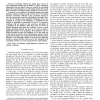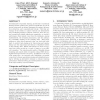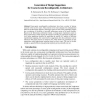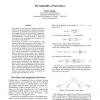468 search results - page 88 / 94 » Application of Fuzzy Rule Induction to Data Mining |
ICDM
2009
IEEE
13 years 5 months ago
2009
IEEE
Advances in RFID based sensor technologies has been used in applications which requires the tracking of assets, products and individuals. The recording of such movements is capture...
TKDE
2008
13 years 7 months ago
2008
Correlation mining has gained great success in many application domains for its ability to capture underlying dependencies between objects. However, research on correlation mining ...
KDD
2005
ACM
14 years 8 months ago
2005
ACM
Discriminative sequential learning models like Conditional Random Fields (CRFs) have achieved significant success in several areas such as natural language processing, information...
FPL
2000
Springer
13 years 11 months ago
2000
Springer
Coarse-grain reconfigurable architectures have been a matter of intense research in the last few years. They promise to be more adequate for computational tasks due to their better...
FLAIRS
2004
13 years 9 months ago
2004
Naive Bayes is one of the most efficient and effective inductive learning algorithms for machine learning and data mining. Its competitive performance in classification is surpris...




